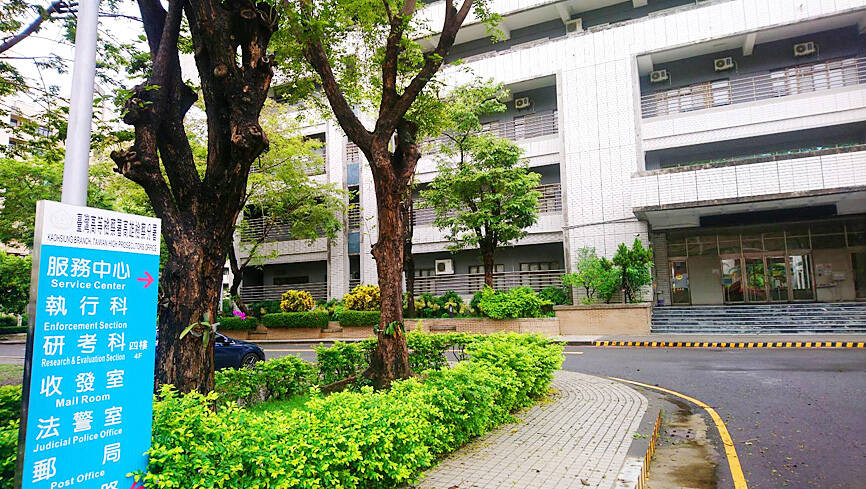A retired air force captain and six active air force and navy officers were indicted in Kaohsiung on Thursday on charges of spying for China.
All seven were charged with violating the Classified National Security Information Protection Act (國家機密保護法) by the High Prosecutors’ Office in Kaohsiung.
Prosecutors and investigators launched a probe in January, detaining a retired air force captain and three active military officers on Jan. 4, while three other active lieutenant commanders were released on bail ranging from NT$100,000 to NT$200,000.

Photo: Pao Chien-hsin, Taipei Times
The detainees included a retired captain surnamed Liu (劉), who is at the center of the investigation, an active commander surnamed Sun (孫), and two lieutenant commanders surnamed Liu (劉) and Kung (龔) respectively.
Following their indictment on Thursday, the court ordered the four individuals to be held incommunicado starting on Friday.
The three others involved in the case remain on bail.
The retired Liu began conducting business in China after leaving the air force in 2013, the investigation found.
He was recruited by China to serve as a spy and, using his military connections, recruit active military officers in the navy and air force to join the spying activities, prosecutors said.
The retired Liu recruited at least six officers into his spy ring and received “rewards” of NT$200,000 to NT$700,000 for each individual he brought into the fold, they said.
The money was channeled through a shell company, and he received bonuses of NT$30,000 to NT$100,000 if his benefactors were supplied with Taiwanese military information, they said.

The High Prosecutors’ Office yesterday withdrew an appeal against the acquittal of a former bank manager 22 years after his death, marking Taiwan’s first instance of prosecutors rendering posthumous justice to a wrongfully convicted defendant. Chu Ching-en (諸慶恩) — formerly a manager at the Taipei branch of BNP Paribas — was in 1999 accused by Weng Mao-chung (翁茂鍾), then-president of Chia Her Industrial Co, of forging a request for a fixed deposit of US$10 million by I-Hwa Industrial Co, a subsidiary of Chia Her, which was used as collateral. Chu was ruled not guilty in the first trial, but was found guilty

DEADLOCK: As the commission is unable to forum a quorum to review license renewal applications, the channel operators are not at fault and can air past their license date The National Communications Commission (NCC) yesterday said that the Public Television Service (PTS) and 36 other television and radio broadcasters could continue airing, despite the commission’s inability to meet a quorum to review their license renewal applications. The licenses of PTS and the other channels are set to expire between this month and June. The National Communications Commission Organization Act (國家通訊傳播委員會組織法) stipulates that the commission must meet the mandated quorum of four to hold a valid meeting. The seven-member commission currently has only three commissioners. “We have informed the channel operators of the progress we have made in reviewing their license renewal applications, and

Taiwan People’s Party (TPP) Chairman Huang Kuo-chang (黃國昌) yesterday appealed to the authorities to release former Taipei mayor Ko Wen-je (柯文哲) from pretrial detention amid conflicting reports about his health. The TPP at a news conference on Thursday said that Ko should be released to a hospital for treatment, adding that he has blood in his urine and had spells of pain and nausea followed by vomiting over the past three months. Hsieh Yen-yau (謝炎堯), a retired professor of internal medicine and Ko’s former teacher, said that Ko’s symptoms aligned with gallstones, kidney inflammation and potentially dangerous heart conditions. Ko, charged with

Taiwan-based publisher Li Yanhe (李延賀) has been sentenced to three years in prison, fined 50,000 yuan (US$6,890) in personal assets and deprived political rights for one year for “inciting secession” in China, China's Taiwan Affairs Office spokesman Chen Binhua (陳斌華) said today. The Shanghai First Intermediate People’s Court announced the verdict on Feb. 17, Chen said. The trial was conducted lawfully, and in an open and fair manner, he said, adding that the verdict has since come into legal effect. The defendant reportedly admitted guilt and would appeal within the statutory appeal period, he said, adding that the defendant and his family have